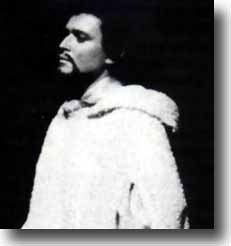José Carreras in Italy
The 1980's

Carreras in I lombardi alla prima crociata, Milan 1984
Carreras Returns After His Illness
The following is a review of José Carreras' first recital in Italy following his recovery from leukemia which took place in the La Scala opera house on March 6, 1989. The original Italian version of this review 'Carreras accende il cuore della Scala' and reviews of his comeback recital in Parma later that year are available here.
Carreras sets La Scala's heart alight
Duilio Courir, Corriere della Sera, 8 March 1989
[English translation © Jean Peccei]
From the very first moment, the singer gave the impression of having recovered his physical and vocal form
An interpretive ability that called to mind Caruso
The thrilling opening notes of Bellini and the exquisite songs of Tosti
Milano, 6 March 1989
A roar of emotion that came from the depths of the heart exploded the other evening at the Teatro alla Scala when José Carreras appeared in the hall. It was perhaps the longest applause and the most moving tribute to an artist since the legendary days of Maria Callas. In reality, the world of music was rejoicing because one of its most beloved figures had won a most difficult battle.
From the way he entered the hall, Carreras immediately gave the impression that although something important had happened, the aura of his interpretation had been neither damaged nor altered by the challenges that he had so courageously faced.
The concert programme the other evening began with Bellini and ended with Puccini. In the central part (accompanied at the piano by Lorenzo Bavaj) there were French songs by Fauré and Duparc, the songs of Paolo Tosti, and Spanish art songs. These are the things that he grew up with and that are the closest to his spirit and to his brilliant career.
Fortunately, what one could see in the La Scala concert that evening was that Carreras continues to remain himself in any musical context. From his voice came resplendent sounds that enchant and that are constantly directed towards extremely beautiful interpretation. In the history of musical performance, one can always hear some sounds which can be recognized in any circumstance or context of interpretation and which remain in the memory like an act of creation. If we were to make a list of names, the first that spring to mind are those of Casals, of Michelangeli, of Caruso. [1]
José Carreras embodies that tradition of the tenor who seems to live in an almost eternal adolescence. An image that was Caruso's. Or Tito Schipa's, which although 'constructed', managed to give you that impression. Schipa counted more on his agility and vocal skill. Carreras possesses a greater degree of innocence which is totally fascinating .
One could see how happy José Carreras was when, after the first thrilling notes of Bellini, he entered the French repertoire and began to transverse that literature of the emotions, rich with its highly existential content and composed with a light, transparent writing. He seemed to want to illuminate and immerse himself in the clarity and beauty of the words. However, even the Tosti songs were sung with an exquisiteness and a floral gracefulness of accent, with a stylistic tension that was capable of ennobling the many 'kitsch' and verismo tamperings which these songs had undergone in traditional performance.
The final, more intense, moments bore the mark of Puccini and brought us back, after the elegance of the Spanish songs, to that absoluteness of singing with which Carreras imbues and sets alight each note - that style which leads to an incandescence of the music - as in his unforgettable interpretations of roles like Rodolfo, Don Carlos, Riccardo in Ballo in maschera, Andrea Chenier and that most memorable of all, Don José in Carmen.
But from this concert that had a triumphant conclusion with the audience, who applauded for over 20 minutes, receiving in exchange two splendid encores, we would most want to remember those winks of the eye that Carreras sent to his friends whom he recognized in the hall and which, for us, had the sense of a joy in life re-found.
[1] In addition to Caruso, a reference to two great musicians - the Spanish (or more properly Catalan) cellist, Pablo Casals and the Italian pianist, Arturo Michelangeli.
This page was last updated on: January 11, 2006